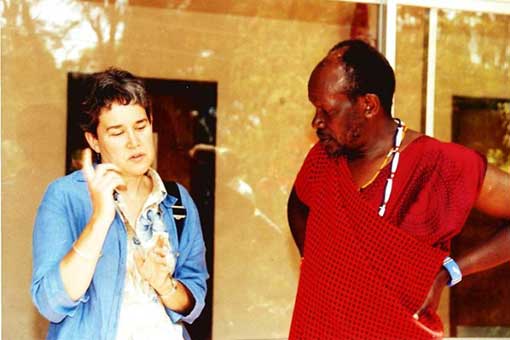Former Dean Dorothy Hodgson
A Path to Being a Better Human in This Complicated World
It is no wonder that Dorothy Hodgson, dean of the School of Arts and Sciences, believes that "language is about culture," and that learning languages functions as a key to "respect and understanding for other people."
 Born in Canada, Hodgson moved around a lot as a child. Her father's work for a multinational corporation meant she lived in South Africa, London, Paris and Brussels (where she learned French in school). She was 13 when she first moved to the United States, her country of citizenship.
Born in Canada, Hodgson moved around a lot as a child. Her father's work for a multinational corporation meant she lived in South Africa, London, Paris and Brussels (where she learned French in school). She was 13 when she first moved to the United States, her country of citizenship.
As a teenager in Atlanta, she wasn't too familiar with American culture, but her wealth of multicultural experiences influenced her continued interest in languages. She took advanced Latin, a language that she now views as foundational to the other languages she learned later on.
All in all, she grew up with the normalcy of multiple languages, which fed her thirst to know more. Hodgson credits this early exposure, her excellent teachers and the opportunity to live in so many different countries as fundamental to her desire and continued pursuit of language learning.
A couple years after college, in 1985, Hodgson visited East Africa to attend the United Nations' Third World Conference on Women, in Nairobi, Kenya, to participate in an NGO forum. While there, she took the opportunity to visit a friend who had recently moved to Tanzania. Surprisingly, she was offered two jobs — one working with a local Catholic church's development team and another as a secondary school English teacher. Her three-month ticket transformed into a three-year stay.
In Tanzania, she learned Swahili, a language that is "easy to pronounce but has a radically different syntax and grammar." Dean Hodgson's work in Tanzania pulled her into a deep language immersion of sorts and she was grateful to Tanzanians for being kind about her attempts to speak. At the time, Dean Hodgson also worked three hours per week with a Swahili textbook to learn the grammar and syntax. Even now, because she has spent more than eight years living and working in Tanzania, and was so immersed in Swahili, she considers Swahili the language she is most fluent in.
Through her work with the Catholic church and community development team, Dean Hodgson also learned some Maa, the language of the Maasai people, who became the primary subject of her ongoing research. Since then — for more than 30 years — she has studied gender, ethnicity, culture and political economy among the Maasai pastoralists and agro-pastoralists in Tanzania. One of the difficulties in learning Maa is that the language was a primarily oral rather than written language. Some missionaries had developed writing systems, grammars and dictionaries, but these varied in quality and consistency.
In order to learn, Dean Hodgson worked with tapes and one-on-one with a native speaker for three months to master the sounds and tones of the language (similar in some sense to the tones in Mandarin). Another challenge was that Maa speakers are not accustomed to others learning their language. In fact, by learning their language she gained the trust of the Maasai people to do community work and conduct interviews for her research.
Before taking an academic position, though, she earned her PhD in anthropology from the University of Michigan.
Based on her decades of expertise, Dean Hodgson has several related pieces of advice for students who are deciding whether to take on a language at college. First of all, she says "just do it!" because without languages one "limits encounters and interactions with others and the world" and misses out on "the joy of language, connections and understanding." Studying other languages makes you think about your own language and your culture's place in the world. It shapes cognition and gives us the "ability to name or not to name and express ourselves, the ability to craft our life stories."
In turn, learning languages makes us better global citizens and shows us that being human can happen in so many ways. Ultimately, "it's about being a human in this complicated world."
This interview was conducted in 2018-19 by Diana Filar, PhD’21.